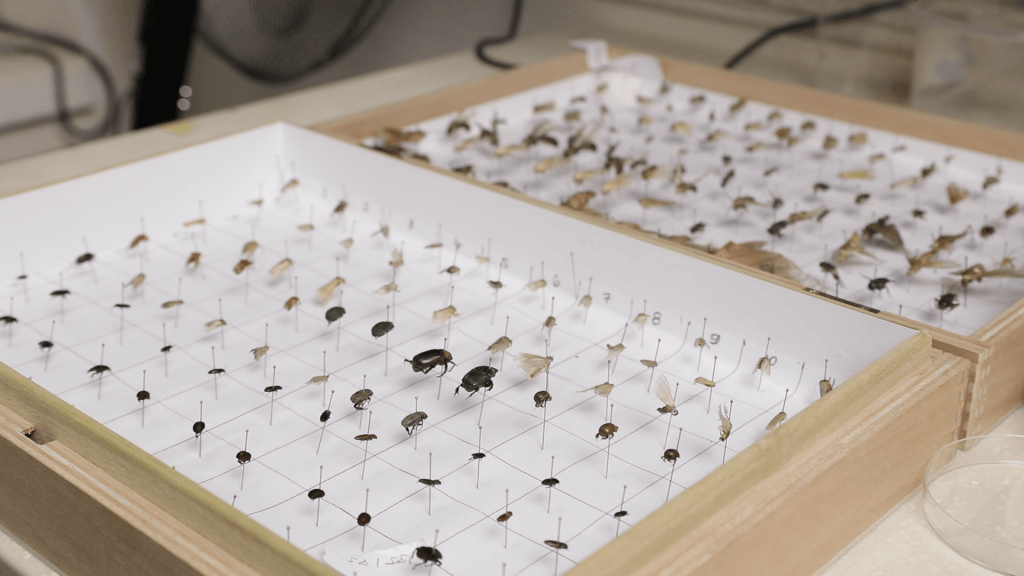Using DNA barcodes in the fight against malaria


Target Malaria researchers at the University of Ghana have teamed up with colleagues from the University of Oxford and the Centre for Biodiversity Genomics at the University of Guelph, Canada, in a ground-breaking research project aimed at investigating the ecological implications of reducing Anopheles gambiae populations.
Because these mosquitoes are major vectors of malaria in Africa, Target Malaria is researching tools that might decrease the numbers of these species in order to reduce malaria transmission. For this research to progress to the field, it is crucial to ensure that the role that these species play in the ecosystem is well understood, so that the intended reductions in their populations would have no unacceptable consequences for neighbouring plant and animal communities.
With this objective in mind, researchers at the University of Ghana have been collecting data on the ground that will eventually lead to the creation of an “ecological network”, a map of how the different organisms in the ecosystem interact with An. gambiae. This will enable us to understand the role of these mosquito species in the ecosystem and accurately model how current interactions would change if their numbers were to be reduced or disturbed.

The first essential step of this project is the creation of a DNA Barcode Library. The library assigns a unique DNA reference sequence to samples obtained from the ecosystem, allowing researchers to catalogue and organise them. Samples were collected over the period of a year from two villages in the Volta Region of Ghana. Target Malaria teams worked closely with residents of the villages to set up different ways of collecting samples. Before this process, all methods and target sample numbers were cleared by Ethics Committees at both the University of Ghana and the University of Oxford to ensure no lasting impact on plants and animals in the study communities.
Once the samples are collected and catalogued, researchers then use the DNA Barcode Library to identify species that share habitats with An. gambiae, or predators of the mosquito such as local birds, bats and other insects. In addition, the host species from which mosquitoes have blood fed can also be identified by analysing the mosquito’s gut contents. These data allow us to map the local ecological web, detailing all species of the ecosystem and how they are interlinked. Researchers can thus quantitatively demonstrate in what way An. gambiae is connected to other ecosystem members.
The ecological research taking place in Ghana is an international collaboration between the University of Oxford, the Centre for Biodiversity Genomics (CBG) at the University of Guelph and Target Malaria. Supported by Prof. Paul D. N. Hebert, the Director of CBG, and Dr. Michelle L. D’Souza, samples from our research centre in Ghana have begun making their way to the centre’s large sequencing platforms in Canada, where, so far, 3000 insects have been processed.
All data from this project will be made publicly available. While some aspects of An. gambiae ecology are well studied, the research in Ghana will provide a more detailed picture of this species’ ecological interactions. According to Dr. Talya D. Hackett, from the University of Oxford, the DNA barcode library that Target Malaria is creating, as well as the broader ecological network is “probably one of the biggest – if not the biggest – constructed to date around the world”. Whilst these data are being collected by project teams to answer a specific question, the endeavour is also creating a wealth of information for the greater scientific community and for other people within Ghana and West Africa.
Target Malaria’s work on revealing species interactions is a key research theme of BIOSCAN, a global research program which the project is part of, that aims to revolutionise our understanding of biodiversity and how to manage it. Led by the International Barcode of Life Consortium, BIOSCAN has three research themes: Species Discovery, Species Interactions, and Species Dynamics. The data collected by Target Malaria will significantly contribute to BIOSCAN’s Species Interactions theme.
To read more about this project and our work in Ghana, visit: https://ibol.org/barcodebulletin/
